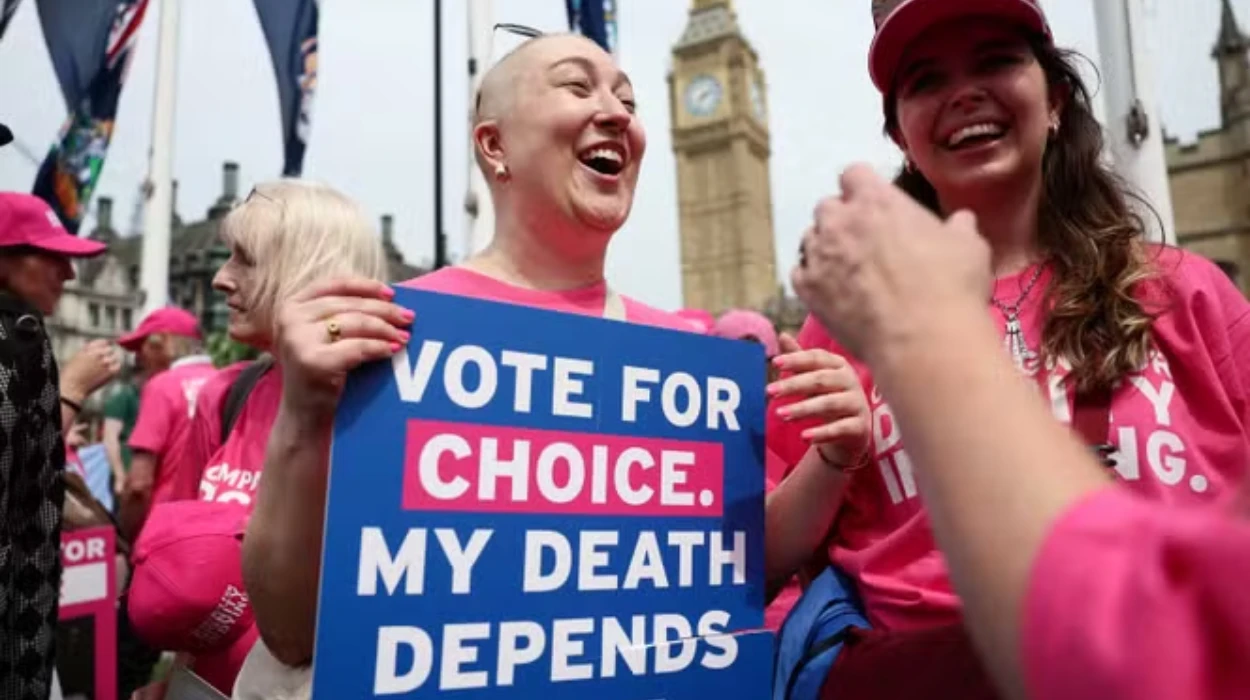London (Parliament Politics Magazine) – MPs have supported a bill to approve assisted dying for terminally ill adults, marking a historic step forward. The legislation will undergo further scrutiny in Parliament before becoming law.
Under proposed legislation, terminally ill individuals in England and Wales could request assisted dying if expected to die within six months.
The bill passed in the Commons with 330 votes in favour and 275 against, including support from Sir Keir Starmer and Rachel Reeves, while Tory leader Kemi Badenoch, Angela Rayner, and Wes Streeting opposed the bill.
Although Sir Keir Starmer supported assisted dying legislation in 2015, he remained silent during the debate and did not reveal his voting intentions to avoid influencing MPs.
MPs and peers will continue debating the bill with potential amendments before requiring approval from both Houses of Parliament to become law.
Supporters of the bill called the vote a historic moment, with Esther Rantzen, a key figure in the debate, highlighting the issue through her own battle with terminal cancer saying that the bill provides “equal choice” for everyone.
She added,
“Those who don’t want an assisted death and don’t want to take part in providing assisted dying can opt out of it, don’t have to do it, don’t choose to end their lives that way. So it offers everyone equal choice, whatever their religion.”
Justice Minister Alex Davies-Jones reiterated the government’s neutral stance on the bill, stating that if passed, they would ensure the bill’s provisions are implemented and enforced effectively.
Kim Leadbeater, the Labour MP who introduced the bill, shared that she felt “a bit overwhelmed” by the result of telling campaigners the bill had cleared its first parliamentary stage.
MPs from both sides of the discussion shared personal stories during a four-hour emotional debate, sharing their personal stories, creating an emotionally charged atmosphere in the chamber.
Due to time restrictions, only a limited number were able to speak in the discussion. Opponents of the bill raised concerns about its future progression, particularly regarding the lack of significant changes to protect against coercion.
Labour MP Diane Abbott voiced her disappointment over the bill’s advancement, expressing doubt that significant amendments could be made during the committee stage.
The vote saw a split within Labour, with 234 MPs backing the bill and 147 opposing it. Key cabinet members, including Home Secretary Yvette Cooper, Work and Pensions Secretary Liz Kendall, and Transport Secretary Heidi Alexander, supported the legislation.
Among those voting against the bill were six cabinet ministers: Angela Rayner, Wes Streeting, David Lammy, Shabana Mahmood, Bridget Phillipson, and Jonathan Reynolds.
The vote also saw divisions within the Conservatives, Liberal Democrats, Reform, and Plaid Cymru.
Leadbeater told MPs the vote marked a generational moment, adding that refusal could delay reconsideration for another ten years.
The assisted dying bill was rejected in the House of Commons in 2015.
Kit Malthouse, a former education secretary, dismissed claims that assisted dying would burden the NHS and courts, questioning,
“Are you seriously telling me that my death, my agony, is too much for the NHS to have time for?”
Peter Prinsley, a Labour MP and surgeon, said his medical experience led him to change his view, having seen the “terrifying loss of dignity and control” at life’s end.
He added,
“When I was a young doctor, I thought it unconscionable. But now I’m an old doctor and I feel sure it’s the right change. I have seen uncontrollable pain, choking and, I’m sorry to say, the frightful sight of a man bleeding to death whilst conscious as a cancer has eaten away at a carotid artery.”
The chair of the Treasury committee, Meg Hillier, became emotional as she shared her teenage daughter’s battle with acute pancreatitis, saying,
“I did not know for five days, in fact many months, whether she would live or die … But I saw what good medicine can do to palliate that pain.”
James Cleverly, the former home secretary, asked,
“If this is such a good thing to alleviate pain and suffering, a right that we should be proud to pass, why are we denying it to children?”
Charlie Falconer, the Labour peer and supporter for the bill, celebrated the vote result with a hug from Commons leader Lucy Powell in Parliament’s central lobby, saying,
“What a result.”
Dignity in Dying organization called the vote result a “historic step towards greater choice and protection for dying people,” while My Death, My Decision stated it would “heartened thousands of people.”


